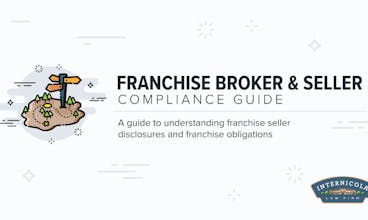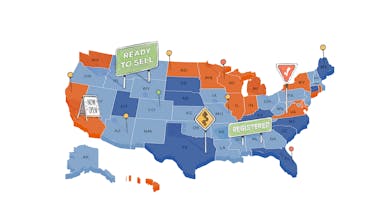Renewing Your 2024 FDD
Learn strategies for navigating the annual FDD renewal process while avoiding missed opportunities and maintaining deals with franchisees.
As Q4 2023 approaches, many franchisors are starting to prepare for renewing their Franchise Disclosure Document (FDD).
Under federal franchise laws, a franchisor’s FDD automatically expires within 120 days of the franchisor’s fiscal year-end. The FDD must be renewed before the end of that period to legally sell franchises in the U.S. For franchisors whose fiscal years align with the calendar year, that means the FDD must be renewed by April 30 each year.
For franchisors that do business in certain states, FDD renewal requirements can vary. A missed renewal deadline in any of those states, or even at the federal level, could mean an expired FDD – and a long “dark period” with no franchise sales.
In this guide, we’ll explore strategies for navigating the 2024 FDD renewal process, including ways franchisors can avoid common mistakes and prevent dark periods while maintaining deals with existing franchisees.
Goals for preparing your 2024 FDD Renewal include:
- Prepare now for a great 2024 FDD
- Enhance Your Competitive Positioning
- Avoid Dark Periods and Registration Delays
- Energize your Item 19
- Avoid the Last Minute Frenzy where Opportunities May be Missed
Prepare Early for a Smooth FDD Renewal
As with any legal or business-related task, preparing early for the FDD renewal process can save you time, energy and hassle as a franchisor. For franchisors renewing their FDD in 2024, the best time to start is right now.
By giving your team enough time to navigate around potential obstacles – rather than waiting until the last minute to collect important documents from franchisees and registering your paperwork at the eleventh hour – you can maintain the flow of your franchise business while avoiding stressful “dark periods” in franchise sales created by missed deadlines and expired FDDs.
FDD Expiration Date
The date your FDD expires can vary depending on several factors, including the end of your fiscal year and the states in which your franchise system operates. As a franchisor, knowing when your FDD expires and requires renewal is critical for continuing to operate your franchise business uninterrupted.
Under the federal Franchise Rule, which applies to franchises operating in every state in the U.S., a franchisor’s FDD expires 120 days after the end of their franchise entity’s fiscal year. This means that if your franchise company’s fiscal year ends on December 31, the federal deadline for renewing your FDD in 2024 would be no later than April 30.
It’s important to note, however, that your FDD expiration date could vary based on various factors including location and fiscal year-end. For example, if your franchise company’s fiscal year-end differs from the normal calendar year’s end, the deadline to renew your FDD could fall on a different date.
Understanding State Specific Regulations
Because the franchising industry is regulated at the federal and state levels in the U.S., FDD expiration dates and renewal deadlines can vary by state. As a franchisor, it’s important to know whether the franchise laws in the states where you do business will impact your FDD’s expiration and renewal deadline.
When it comes to complying with state franchise laws, franchisors should pay attention not only to the franchise laws of the states in which their brand does business but also to the states in which their franchisees live. For example, a franchisor selling a New York-based franchise business to a New Jersey resident means both parties must comply with both states’ franchise laws – not just the state in which the business operates.

Learn more about state specific franchise laws by visiting our interactive map.
Registration States
Certain states, called Franchise Registration States, impose supplemental franchise regulations that franchisors in those states are required to adhere to, in addition to the federal franchise regulations issued by the Federal Trade Commission.
Currently, there are 13 Franchise Registration States in the U.S. including California, Hawaii, Illinois, Indiana, Maryland, Michigan, Minnesota, New York, North Dakota, Rhode Island, Virginia, Washington and Wisconsin. Franchisors whose principal trademarks are not registered with the U.S. Patent and Trademark Office must also register their FDD in Connecticut, North Carolina, South Carolina and Maine. Other states, called Filing States, require state-specific annual franchise filings.
Because of potential conflicts between state and federal franchise laws and deadlines, particularly in the Franchise Registration States, it’s important to remember that your FDD expiration and renewal deadline could differ from the federal FDD renewal deadline, depending on where your franchise operates. For example, in California, which is a Franchise Registration State, a franchisor’s FDD automatically expires 110 days after their franchise entity’s fiscal year-end. Because of that, franchisors in California must renew their FDD at least 10 days earlier in that state than at the federal level each year to prevent their FDD from expiring there.
Non-Registration States
The majority of U.S. states are non-registration states where franchisors are required to have an FDD and a federally registered trademark but are not required to file or register their FDD with a state regulator before offering or selling franchise opportunities there.
It’s important to remember that franchisors in non-registration states are still required to comply with federal franchise laws. Even in non-registration states, allowing your FDD to expire at the federal level can result in being legally prohibited from offering or selling franchises until your updated FDD is approved.
To ensure that you fully understand the state and federal franchise laws that apply to your franchise system, consult an experienced franchise attorney before renewing your FDD.
What is a Dark Period?
The phrase dark period refers to a period during which a franchisor is legally restricted from offering or selling franchises. Extended dark periods can result from allowing your FDD to expire by not renewing it before the federal and/or state deadline. It is called a dark period because a franchisor’s franchise sales “go dark” during this period.

Global Dark Periods
A global dark period refers to a period when a franchisor is legally restricted from offering or selling franchises anywhere in the U.S. at the federal level. Global dark periods often result from two common issues:
Failure to renew the FDD before its federal expiration date
Under federal laws, franchisors are required to have an up-to-date and legally issued FDD to offer or sell franchises in the U.S. An expired FDD can trigger a global dark period during which your franchise sales will come to a standstill while waiting for your updated FDD to be approved.Material changes to disclosures
Under federal franchise laws, franchisors are required to update their FDD whenever there is a material change to the information disclosed in it. Changes to your Item 19 Financial Performance Representations must be updated immediately. These changes must also be reflected at the state level through a state-specific amendment process. A global dark period can be triggered during the time between your FDD being updated and when it’s approved.
Because it can sometimes take months to get your FDD approved after its expiration, it’s important to pay attention to federal FDD renewal deadlines and start the renewal process as early as possible each year.
State Specific Dark Periods
Unlike global dark periods, state-specific dark periods occur when a franchisor is legally restricted from offering or selling franchises within a specific state.
State-specific dark periods apply only to franchise sales in states where the franchisor’s FDD has expired, or another compliance issue has legally restricted them from offering or selling franchises in that state. For example, if your franchise system has locations in California and New York and your FDD was renewed on time at the federal level and in New York, but not in California, a state-specific dark period would be triggered in California. However, you would still be able to legally offer and sell franchises in New York.

Why It Matters
Time kills deals – and having an FDD reapproved after its expiration can be a slow process. Because of that, the delays caused by dark periods can have serious consequences for your franchise system’s growth and financial health.
As a franchisor, it’s critical to begin the FDD renewal process as early as possible to allow enough time to gather required information and documents, and avoid common mistakes that can lead to extended dark periods, missed opportunities and interruptions in franchise sales that can benefit your competitors.
FDD Renewal Best Practices for Avoiding Missed Opportunities
The FDD renewal process can be stressful. It’s often difficult to obtain necessary documentation and data from accountants and franchisees who are busy with clients and daily operations. State examiners can also take time to return calls or approve filings.
Instead of getting upset with others over delays that are outside of your control, though, a more effective strategy is to identify which tasks are within your control and tackle them as soon as possible.
Preserve Franchisee Deals
As a franchisor, preserving deals with franchisees is certainly within your control. Consider using the annual FDD renewal process as a strategy for saving deals with any existing franchisees whose franchise agreements are slated to expire before your 2024 FDD renewal date.
Below are some strategies to keep in mind when attempting to preserve deals with franchisees and prospective candidates:
Avoid issuing your new FDD until you’ve closed every deal you can close
Use the changing FDD as an incentive for franchisee candidates to sign
Start pushing to close deals early in the year
Because your 2023 FDD will be outdated, and therefore illegal to issue, once your 2024 FDD is issued, it’s important to focus on closing as many deals as possible before your FDD is renewed.
If you’ve started negotiating a deal that hasn’t been closed before your FDD is renewed in 2024, you will be legally obligated as a franchisor to redisclose your new FDD to those candidates, even if you’ve already disclosed your 2023 FDD to them. This will restart the 14-day FDD disclosure period. Redisclosure of your 2024 FDD should be done as soon as possible after it is approved by federal and/or state regulators.
Be Proactive
As a franchisor, being proactive is critical for success in franchising – especially when it comes to your FDD. Consider the following strategies when renewing your FDD for 2024:
Know your renewal deadline(s). Most brands have an annual renewal deadline of April 30, in compliance with federal regulations. If your brand operates in the Franchise Registration States or Filing States, remember to take state-specific renewal dates into account also.
Set a filing deadline. Consider a deadline of February 14.
Submit documentation early. Most franchisors submit their renewal documentation in March or April.
By being proactive about annual renewals, you can avoid delays and shorten dark periods – and get back to selling franchises faster.
Getting Your Renewals in Early
While it might seem ambitious to set a filing deadline on February 14, it’s doable for franchisors who are willing to take the initiative.
Some strategies for hitting your February 14 target include:
Tackle Item 7 and Item 19 early. Notify your franchisees and aggressively collect data as early as possible in the new year.
Bring accounting on board. Encourage your accountants to be aggressively engaged in the FDD renewal process.
Strategize. Know which states you want to operate in and make a plan to comply with their franchise regulations.
Financial assurance. Confirm that you will be able to satisfy any financial assurance requirements in the states where you operate as a franchisor.
Understand what needs to be updated. Make sure you know the specific FDD items that need to be updated and what information you’ll need to complete that task.
Have a franchise attorney. The FDD is an important legal document that is required to sell franchises. To make sure the document complies with all state and federal franchise laws, it’s critical to work with an experienced franchise attorney.
By following best practices, you can avoid pitfalls and meet this deadline with ease.
Competitively Position Your FDD
Although the FDD is a federally mandated legal disclosure document that is required to offer and sell franchises in the U.S., it’s also an important sales tool that you can use to distinguish your franchise offering from other brands.
When updating your FDD, consider the following strategies to competitively position your FDD:
Energize your Item 19 disclosures. Go beyond the boilerplate and make a financial performance representation plan. Use your brand’s financial data to tell future candidates a success story.
Evaluate your offering. How do your franchise fees, territory structure, and Item 19 disclosures stack up against your competitors? Do any changes need to be made?
Scrutinize your data collection practices. Are you collecting data efficiently for a better Item 19 in 2024? If not, how can you improve?
Set milestones. Make sure your 2024 FDD is structurally sound by December 31, 2023.
Start today. Start communicating with accountants now and gather any information needed to have your franchise system’s 2024 audit ready by February.
Whether you’re a startup founder or a seasoned franchisor, making a solid plan – and sticking to it – is the key to franchising success. By taking a clear-minded and proactive approach to your 2024 FDD renewal process, you can avoid extended dark periods and start your new year off on the right track.
Are you renewing your FDD in 2024? Contact us to learn how we can help your brand stand out from the competition.



